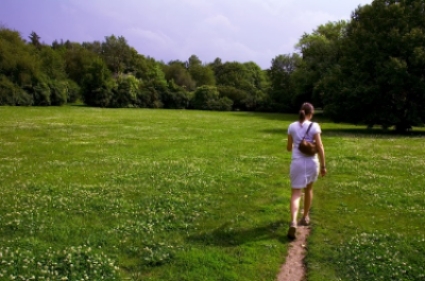
The other day I was standing in line at a store near my home, waiting to buy a Father’s Day card. The only line open was at customer service; no other cashiers were visible. There were three people, total, in line (I was last) and none of it seemed like any sort of problem to me.
The woman in front of me, however, considered it a big problem. She was in a hurry; why didn’t they open up another line? She kept craning her neck to see around the woman in front of her, who glanced back occasionally with a sharp expression.
Soon enough, a cashier came over and announced that he was opening another register and we were welcome to step over. “Thank God!” said the woman in front of me.
At this point, the woman in front of her turned around and snapped, “Why do you have to be so rude to everyone?”
The woman in front of me seemed shocked. “I am not rude!” she shot back. “What did I do that was rude?”
Their conversation escalated as they tried to get ahead of each other in the new line. I stayed right where I was at customer service, half-amazed and half-bemused at how they were going back and forth.
At a deeper level, though, it didn’t affect me in the least.
I hadn’t experienced the woman in front of me in line as rude. I had experienced her as anxious, and, in fact, I’d had some empathy for her, and had been planning, if we’d waited much longer, to engage her in some conversation about the ceramic plates she was holding (they had lobsters on them).
Now, lest I come across here as mellower-than-thou, let me tell you, this is not usual for me. Sometimes, when I encounter high emotion in others, I absorb it right up like a sponge.
That didn’t happen in this instance because I was feeling grounded. Actually, at that particular moment, quite exquisitely grounded.
What made this day, or moment, different than others where I would have reacted (if not verbally, at least emotionally) to the scene unfolding around me?
• I was at the tail end of my morning walk, which helps me feel connected to my body and to the earth, 95% of the time. I was relaxed within my own body, and, as a pleasant side-effect of that, I felt a solid awareness of what belonged to me and what belonged to others. To put it in Byron Katie’s words, I was in my own business.
• At that moment, I felt physically and psychologically sound. I wasn’t hungry, I wasn’t lonely, I wasn’t angry, and I wasn’t tired (read more about referring to the helpful acronym “H.A.L.T.” in this post).
• I was in a space of self-acceptance and feeling kind to myself (another frequent by-product of my morning ritual).
All of this contributed to my being in what Elaine Aron, author of The Highly Sensitive Person, calls your “optimal range” of stimulation.
This is the place where, in terms of your nervous system, you feel at ease. You’re neither bored and restless nor bouncing off the walls with excitement. In this space, you’re good. You feel comfortably connected to yourself.

Animals, too, have an “optimal” range of stimulation, and cats (who are masters of the art of self-care) are good teachers for us here. My dear cat Slinky, who passed away in 2010, had quite a low threshold for stimulation. If I pet her for more than twenty seconds or so, she’d start to thrash her tail, and, as I quickly learned, if I continued petting after the tail thrash had begun, I was in for a nip to my hand.
Sullivan (my current feline friend whose pictures you can see on the pages of this site and who has outlived Slinky by nearly seven years now) is totally different. I can pet him non-stop for hours and he will not get overstimulated. He’ll lounge on my lap while I work, fall asleep and forget I even exist. (Slinky wouldn’t get on my lap — a lap would be way too overstimulating for her!)
When I work with clients on self-care, one of the concepts we always get around to discussing is looking at our lives through the lens of stimulation.
Highly sensitive people have nervous systems which pick up on subtleties and process them deeply. Because of this tendency, they may (like Slinky!) have a somewhat narrow window in which they feel comfortable and at ease, nervous-system-wise. (If they are high sensation seekers as well, the window may be even tinier!)
Had I been already overstimulated when the argument between the women in line arose, I likely would not have been able to view the situation with detachment and compassion. My nervous system would have already been on overload.
Getting grounded — to that place where you feel internally stable, centered, and solid — is fundamental not just to supporting your own nervous system, but to getting a clear, clean sense of what is true — and what kind of response is required of you.
For example, I received an email the other day which contained some feedback for me. When I first read the email, it was toward the end of a long day and I felt drained and irritated. From this place, I interpreted the email as unnecessarily harsh. Taking note of my emotional and physical drain, I flagged the email to respond to later.
The next day I took a look at it again. From that rested, solid, post-morning-ritual space, I saw the email in a different light. In fact, there was a lot of positive feedback in it, and the sender then offered me a couple of suggestions for “next time” (indicating his desire to work with me in the future!).
That drained, overstimulated end-of-the-day space caused me to read things into the email that weren’t there, and I could give you countless other examples of this phenomenon. In fact, when I look back on my growing-up years, so many times I concluded that “something was wrong with me” when I was just feeling overstimulated (but had no frame of reference for such a thing!). Many of my clients report the same experience.
In this day and age of tons of emotion being tossed around in the online world as well as the “real” one, it’s more fundamental than ever to notice when you are getting uncomfortably overstimulated, and to bring yourself back to stability.
What does “grounded” feel like for you? What do you notice about the difference in how you respond to situations when you are feeling grounded vs. when you don’t? I’d love to hear from you.
Above images of woman walking © Peter Gustafson | Dreamstime Stock Photos and cat © Photozek07 | Dreamstime Stock Photos
This is really good. And really wise. Same thing has happened (and has currently) many, many times. The life of an hsp! (and hss too for me!). Thank you.
LikeLiked by 1 person
Thanks, Kathryn! So glad to hear it resonated for you. Yes, that fine line we walk with HSP/HSS can be tricky for sure. Always good to hear from you!
LikeLike